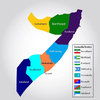While not a popular opinion, the Somalia from 1960 to 1991 will not be returning.
It has now been 60 years since independence and for half of that period the country has been a failure .... that should tell us something. We have been more disfunctional than functional in our nation's entire history.
Historically, Somalis have not been unified into a single state and I believe that as a society we are not yet ready for this endeavour. That does not mean that in 10 years, these separate republics count not join together.
The benefits, in my opinion, of having 7 or 8 Somali republics are outlined below:
Better local representation - the larger the nation the more difficulty in ensuring a representative form of government. Look at the issues in the FGS.
Better functioning states - ask yourselves which function better - SL/PL or the FGS. Clearly the answer the former rather than the latter.
Increased jobs and opportunities - We have the highest unemployment in the world. Rather than once again having most jobs in Mogadishu, our people will benefit from government, NGO, private business, embassy jobs spread throughout the country.
Better local development - we can super charge the country's development. We can see that PL and SL are way ahead of other regions in this regard. Somalis will not need to move far away for jobs and the local economy benefits (no need to repeat the errors of the past with Mogadishu-focused investment). We would see more airports, sea ports, roads, community development, NGO support, etc.
Increased influence internationally - 7 or 8 Somali republics will ensure more influence in the Muslim world. Size doesn't matter - many small countries have strong economies and political influence in the world (Rwanda, Taiwan, Singapore, Djibouti are all good examples). Just as a comparision, the region of Bari is the same size as Sierra Leonne!
Increased prominence of Somali language / culture in Africa - Somali will become a lingua franca among the HoA and East African countries, thus increasing the status of the language in the African Union. It can perhaps one day become an official AU language.
It has now been 60 years since independence and for half of that period the country has been a failure .... that should tell us something. We have been more disfunctional than functional in our nation's entire history.
Historically, Somalis have not been unified into a single state and I believe that as a society we are not yet ready for this endeavour. That does not mean that in 10 years, these separate republics count not join together.
The benefits, in my opinion, of having 7 or 8 Somali republics are outlined below:
Better local representation - the larger the nation the more difficulty in ensuring a representative form of government. Look at the issues in the FGS.
Better functioning states - ask yourselves which function better - SL/PL or the FGS. Clearly the answer the former rather than the latter.
Increased jobs and opportunities - We have the highest unemployment in the world. Rather than once again having most jobs in Mogadishu, our people will benefit from government, NGO, private business, embassy jobs spread throughout the country.
Better local development - we can super charge the country's development. We can see that PL and SL are way ahead of other regions in this regard. Somalis will not need to move far away for jobs and the local economy benefits (no need to repeat the errors of the past with Mogadishu-focused investment). We would see more airports, sea ports, roads, community development, NGO support, etc.
Increased influence internationally - 7 or 8 Somali republics will ensure more influence in the Muslim world. Size doesn't matter - many small countries have strong economies and political influence in the world (Rwanda, Taiwan, Singapore, Djibouti are all good examples). Just as a comparision, the region of Bari is the same size as Sierra Leonne!
Increased prominence of Somali language / culture in Africa - Somali will become a lingua franca among the HoA and East African countries, thus increasing the status of the language in the African Union. It can perhaps one day become an official AU language.



